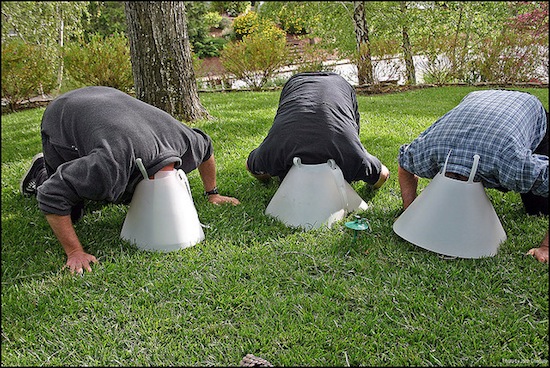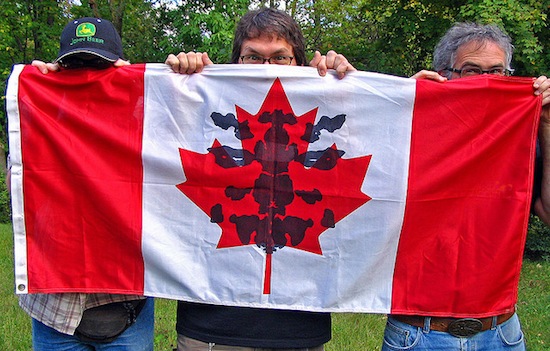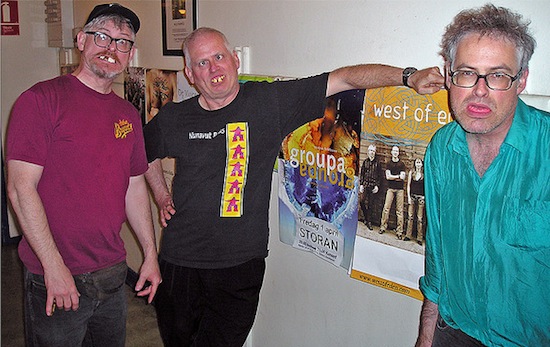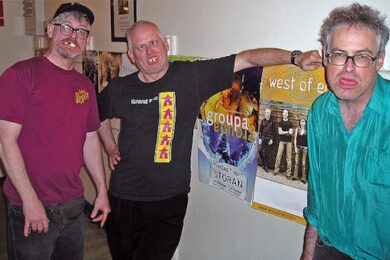Listen to NoMeansNo on Spotify here!
Canadian progressive punk trio NoMeansNo were formed in Victoria in 1979 by brothers Rob Wright (bass guitar and vocals) and John Wright (drums and vocals). Early recordings made in their parents’ basement had a distinctly new wave sound as evidenced by early self-released 7” singles. The more experimental sound of first album Mama (1982) was written and recorded as a duo. Guitarist Andy Kerr joined on guitar and vocals in 1983 and stayed until 1992, when the core of the Wright brothers recorded Why Do They Call Me Mr Happy? before adding current guitarist, Tom Holliston, from the band Showbusiness Giants. Although they are often described as a hardcore punk band, NoMeansNo are an entirely unique entity with many varied influences at play. During their career they have released 12 excellent studio albums, each deploying a different perspective to the last, as well as a number of EPs, a live album and a live DVD. They also perform in the guise of their punk rock alter ego The Hanson Brothers. They continue to tour extensively and their live shows have become legendary for their incredible energy and musicianship. For anyone who has seen them play, it is an inescapable fact that Rob and John Wright share an incredible, unequalled degree of instrumental interplay. John Wright’s drumming is simply astonishing. He brings the kind of skills normally not seen outside of the highest level of improvised playing to an extremely energetic punk rock context, plying supple, rolling tribal offbeats alongside expressionistic waves of shimmering cymbals. Although they are, in my opinion, an utterly unique proposition, NoMeansNo should appeal to fans of the Minutemen, Shellac and Fugazi, and even bands like Wire and Devo. Their last minute arranged sell-out show at the Lexington in London offered further, consolidating proof of their prowess as a live band. I caught up with John Wright the following Sunday, before their show in Brighton at the Haunt.
NoMeansNo are renowned for having one of the best rhythm sections in the business, can you comment on how your origins as a two piece influenced your sound?
John Wright: When we started out, all the kind of alternative punk rock was exploding at that time, in the late 70s, and it was definitely an inspiration to play music. I played in a local punk/new wave band that was really fun to play in… but my brother and I had been writing music together for a while and we were talking about playing live but we didn’t really know any guitar players. So, essentially Robbie was like, “Well look, if we’re gonna play live then we have to write some songs for bass and drums.” And at this time, there were bands like PiL, Pere Ubu, Gang of Four, all these kind of post-punk bands – so the idea of us just doing bass and drums and singing was not a problem really – but because of the fact that we didn’t have a guitar player, we couldn’t rely on guitars to fill out the sound, you know, you had to do more on the drums, and the vocals become a much more important part of the arrangement. Essentially, it was just so we could start playing live and not having a guitar player, we were just forced to do this. So we are, right from the beginning, having to write in different kinds of song structures and at that time too, it was kind of anything goes, you know the sort of "be yourself" attitude of punk rock. And we literally wrote most of [first album] Mama, practiced the songs and played our first gig. We did that a little bit, but this other band I was in, the guitar player/singer I became good friends with. When that band kind of came to an end, we said, “Well, why don’t you come and play with Rob and I?” And this would be Andy Kerr, our first guitar player. But when he joined, of course, we already had this established. You know, the bass playing… really, what is now a kind of dubstep arrangement, with looping riffs and whatnot. So when he joined as a guitar player, it was more to try to add colour to that and it wasn’t just a guitar riff oriented approach to music. So right off the bat, we had a different set up. Being a two-piece to start out, really is what established a sort of different kind of approach to the music.
I’ve seen in other interviews with you that people have mentioned your fellow Canadians Rush before, purely by chance I happened to see them play exactly a week before your London date…
JW: I know! They were in Manchester the night we played…
Well, I’ve liked them since I was 11…
JW: [Laughs]
I think they gave a great performance. And obviously he’s another really great drummer, as you are. Is it a coincidence that two of the best drummers in ‘rock’ music are Canadian? Does Canada spawn great drummers? Are there any other drummers that you like personally? I mean, I can hear a jazz element to your playing are there any other players you are influenced by?
JW: Oh yeah, well, when I was young and learning drums in school, playing in the orchestra of course, the drum set was all jazz band, so you know, there was Buddy Rich and Gene Krupa, the old famous big band drummers were always like, amazing to me. I never really idolised and drummers or wanted to emulate any… and I was never a Rush fan, so I’ve never really listened to Neil Peart. I saw Buddy Rich play once. He was incredible, although he was supposedly quite unpleasant, personally.
You mentioned other influences before. For me, although you are described as a hardcore band, it’s obvious that you have a lot more going on than a lot of other such bands – new wave influences such as you’ve already mentioned. The Residents, I know you covered a Residents song [‘Would We Be Alive’]. How did those influences come together to begin with? Where you raised as music fans?
JW: Yeah, yeah… it was just that all that music was so fresh and exciting to listen to and we loved all these bands. You know, why does one band creep into your music more than another? It’s hard to say really. Like the Ramones was always our super favourite band but there’s not really much Ramones in NoMeansNo music. The Hanson Brothers is kind of our tribute to the Ramones. So it’s really kind of hard to say… but it was all that new music that was inspiring us and all the other young bands at the time. The jazz thing, was again… Robbie loved jazz music, he was really into Miles and a lot of stuff from the early 70s and I learned how to play the drums in school in a jazz band. We always had an aspect of jamming – my brother and I would always jam all the time. So in live concerts, there’s always some song that ends up in some kind of jam. And its fun for us on stage and I think it’s interesting for the audience when the band kind of goes off on something. I mean, on the daily grind of the tour, it becomes less and less spontaneous.
I love the cover of ‘Bitches Brew’ [from One]. That’s personally one of my favourites.
JW: That was Robbie’s project.
It’s really something to take a track such as that and make it entirely your own…
JW: Yeah, which is why we put the Ramones right after it. A little bit of the bookends, you know…
Do you know the book Our Band Could Be Your Life?
JW: No.
It’s a book written about alternative American bands. Really, if the remit had have been broader, you should have been included. It deals with Black Flag, Mission of Burma, the Minutemen… Do you feel any affinity with any of those bands particularly? I would have thought the Minutemen perhaps, as they also have such a strong rhythm section.
JW: Yeah, I mean, Mike Watt we’ve met several times. We never played with the Minutemen and never saw them before D. Boon died, but we played with Firehose and with Mike Watt several times. Fugazi we played with one time. Never played with Black Flag but saw them a number of times. Yeah, I mean all of these bands, us and those bands, everyone was grinding out the circuit in the United States and Canada, so you know, you share a certain common experience with these people. Every one is different… Canadian bands are quite different from American bands.
Do you feel that being Canadian, you had to forge your own path, rather than being part of any particular scene?
JW: In some ways yeah. But we were on the coattails of DOA, on our first real American tour. I mean, we did one on our own… I don’t think we played a Friday or a Saturday night for three months. It was a scratching tour but we got out there and did it. The next time we went to the States we did seven weeks backing up DOA, so we had a crowd every night. This was back in 87, they were still drawing quite well. They were a great band and that was kind of, I think, their pinnacle really. They were from Vancouver as well. We’d done a lot of our own stuff up until that point but it was great to get out on tour. DOA really set the standard early on and were a big influence on a lot of bands.
Is there any new material in the pipeline? There were the last two EPs and before that All Roads Lead To Ausfahrt from 2006…
JW: Yeah, we haven’t been releasing them on much of a regular schedule. Tonight we’re playing three songs from the new EPs and that one song, the rearrangement of ‘Ghosts’ from 0+2=1… we rearranged it and it’s now called ‘The Ghosts of Time.’ It’s in the middle of the set, so if there was something you didn’t recognise… there’s a version of it on our website nomeanswhatever.com and we’ll probably release the cut-up version. I cut it up and just rearranged it on computer and it turned out really well so we learned it to play live. So the version you hear live is a much more organic… on the site you’ll hear all the cuts as it’s literally lifted off the CD. It was fun to do.

Are there any new songs bubbling under when you guys rehearse?
JW: Yeah, there are some new songs there. We have at least an EP of new songs that we haven’t recorded yet. But my brother’s just got a new family. He’s got a two and a four year old now. There’s a lot of personal things going on that have just put a few hurdles in front of us and we haven’t gotten around to recording these EPs. We really wanted to have the third one out before we started these tours and then put a fourth one out this year but we just compromised basically.
What do your kids think of your music? I mean, looking around at the audience at the Lexington the other night, there were a lot of young people there. I think that’s a real vote of confidence in a band that have been around as long as you have.
JW: They like it… but I mean, I think it’s kind of a weird thing for them, being teenagers and wanting to be into crazy music or whatever and I think it’s kind of a bummer when, you know, your dad plays it (laughs). It’s just too bad that they can’t see us, probably ever, due to age restrictions.
There’s a lot of stuff said in the business that the future of bands is in constant touring. How do you maintain such a loyal following – above and beyond having a great repertoire of songs? Do you still make a living from the band or do you have to work at anything else to make ends meet?
JW: We still manage to make a living although it’s definitely dwindled. We manage it mainly because of the exchange rate, because the Canadian dollar is worth so much and the euro has tanked and the pound is not worth much. The US dollar tanked years ago. That’s what killed us really. I probably took a 25% cut in pay because of exchange rates, more than anything else. The shows have been pretty steady and constant. We never really sold a lot of records, so the whole downloading thing – we didn’t feel a huge bite like some bands did. Our income didn’t really rely on record sales, except live offstage we still sell really well. So mainly what really hit us was the exchange rate and, of course, just the economic downturn. There’s less entertainment dollar out there, so like everyone else we’ve taken a bit of a hit as far as attendance. That said, after this tour, I haven’t made enough money to live come the fall, so I’m gonna have to make some money some other way until we tour again. Which is the first time in a long time.
Do you do any other music projects, apart from the Hanson Brothers?
JW: No. I mean, I suppose I could but I have no idea about self-promotion. If someone calls me up and says, “Hey, I want to pay you a ton of money to drum for me,” I’ll go “OK.” If it’s not something awful or horrible I’d be glad to do it.
Do you have any – for example obviously Nirvana were enormously popular a while ago – do you have any better known fans who could be fighting in your corner?
JW: Well Dave Grohl apparently is a huge fan, so we’re just waiting for the call, you know [laughs] “We wanna cover one of your songs and make you a millionaire…”
I think it’s good when other musicians who are maybe making a bit more money pay their dues and respects to others…
JW: Well I think he’s got a good reputation for that. I know a lot of his crew are old time punk rockers that are making more money now than they ever made playing music. But you know, there are plenty of musicians now who all grew up in the same time as we were playing… and none of them have covered our music and made us rich yet. [laughs]
Do you have any feelings about the downloading issue? I saw an interview with Rob where he said he thought it was a good thing that corporations like Sony should stop being record companies and get back to making electronic equipment. But on the other hand it’s hard for new musicians…
JW: I mean it is, yeah. As far as I’m concerned, the more people who hear you, the more people are going to come to your show and buy a T-shirt. But, at the same time, it destroys sort of a seed. Because as bad as record labels were on the major scale, on the smaller scale they developed and organised seeds. Now it’s very difficult for a label to be a label in a traditional sense, so it’s hard for bands to have some support mechanism to put them into a circuit, into a place where they can work it and get shows and be promoted. Everything’s just all diffused now and it’s all self-promotional and a YouTube lottery, and I think it would be extremely difficult for young bands now – more difficult than it was for us. It’s back to the time where you are either on your own, or you have to completely capitulate to the industry. Although, certainly hip-hop and electronic music is kind of now the new self-supporting industry.
I bought a NoMeansNo remix album the last time you played the Underworld in Camden. How did that come about? I’ve heard it said that Rob’s really into electronic music at the moment, any particular kind?
JW: I think he’s mostly into dubstep, but he’s kind of listened to everything.
I like the new opening with the electronic remix of ‘The River’, I think it works really well.
JW: Yeah, well that’s what inspired him to get a hold of some of these producers [for the remix EP] and they’re all ex punk rockers (laughs).
Can you comment on the difference between NoMeansNo and the Hanson Brothers and how the songs are divided? I noticed you did more punk covers at the Lexington show than I’ve ever seen you do before. Is that just a matter of on the night, how you feel?
JW: Well, we did a benefit show in Vancouver to raise some money for a foodbank that Robbie volunteers at. We did ‘NoMeansNo clones the Ramones’ and we played It’s Alive, from beginning to end, verbatim. Exactly – all the banter and everything. Well a few minor interpretations. So, 28 Ramones songs – this was only a few weeks before we went on our tour – we have all these Ramones songs fresh in our minds and it’s good fun for us at the end of the set just to bang out some songs.

Can you comment on how Jello Biafra losing control of the Dead Kennedys’ music affected you and other Alternative Tentacles bands?
JW: I have no idea, but I know that Alternative Tentacles has survived and is still doing well from what I understand but we haven’t had anything to do with them for a while now, 2004/2003… nothing bad but. I had nothing to do with the other bands – it was an internal fight, which he lost. He wanted control over everything, basically.
What’s he like as a character? He seems an interesting guy.
JW: Very eccentric, very smart. We always got along with him. You know, he lives in a bit of a weird world as a celebrity, but still very politically minded, and active. He likes to bring a lot of attention onto himself, but he’s a good man and Alternative Tentacles was a great label, in the sense that it was really about the music, for him. And you know, he’d just sign bands that he saw and liked live. It wasn’t about trying to cash in on some kind of scene, or picking a band because of sales potential – just what he wanted to put out. Which meant, you know, it could be up and down financially because some stuff doesn’t sell, right? But thankfully the Dead Kennedy’s sold so well, that he basically was able to keep his label alive.
Now that you are all fathers, do you worry that your children might grow up as baleful and cynical and as full of body horror as you did? Or, do you see this stance as a safety valve? I personally think there’s a lot of humour in the darkness of your lyrics…
JW: Yeah, of course there’s humour there. But likely they’ll grow up to be bankers [laughs]. That’s what happens – hippies produce all these crazy straight people and the straight parents produce hippy kids… They don’t wanna be like their parents.
It’s really good that you are always revising the setlist, given that you have such a wealth of great material to draw upon. Are there any that you feel like you would like to do that maybe Rob doesn’t want to… I mean, I don’t think there’s any chance of seeing you do ‘Bitches Brew’ live is there?
JW: We did play it live. It’s a difficult song to pull off live, especially because it kind of needs in that second half an instrumental arrangement that requires more than our usual set up. We did it once live because we were playing with a band called Zu, the Italian avant-garde band. And we got their baritone sax player to come out and join us for the second half of the song, so it was really interesting. We had been invited to play the Vancouver jazz festival with them. So we thought, what better opportunity to play a Miles Davis song…
I have heard that your shows are often plagued by some sort of technical malfunction or another. Did Rob kill several basses, I know one died at the Lexington…
JW: Three so far this tour, of which two have been revived…
This is down to the high level of energy, no doubt?
JW: The high level of neglect [laughs].
What’s the worst thing that has happened while you were on stage? I heard that your guitarist Tom had an asthma attack, how did you deal with that?
JW: That was a London show actually. Robbie played a couple of songs just the two of us, but that was all we could do. The worst thing to happen onstage? I remember the first time we played in Milano, I believe, the original communist squat there… and a whole bunch of communist squatters from Torino showed up and decided that they shouldn’t have to pay because, "We were all communists here." And of course, it all flows up into a huge argument, until about 30 or 40 of the Torino people decide to break down this ginormous steel garage door in order to get into the place. We were trying to, like, set up to play and this "Bang! Bang!" was going off and all of a sudden, they got in and it was like a fucking bar room brawl, like 50 people in fist fights all around us and we hadn’t even started playing yet! And it was like, "Holy fuck, this is insane." But finally it calmed down and we were just waiting around but the promoters were like, “No, no, you should play…”
When was this?
JW: This was like 89 or something. So we started to play and within about two songs, somebody punched somebody and the whole thing erupted into another ginormous brawl in front of us again… and we packed up laughs].
Ok, that is pretty bad…
JW: I just thought, I don’t wanna be the background noise for this kind of nonsense…
Southern Records continue to rerelease albums from the NoMeansNo back catalogue, often on highly delicious coloured vinyl editions



